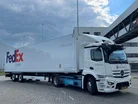FedEx Express Shifts Towards Sustainable Logistics

Logistics is the crucial bridge connecting raw material production, manufacturing, retailers and customers.
However, the environmental toll of traditional, combustible logistics is significant. The field has long been a focal point of consumer concerns regarding climate impact, with issues like 'food miles' taking centre stage in the early 2000s.
Today, sustainability is increasingly becoming a priority for companies, with a shift towards achieving net-zero operations. The emphasis on sustainability in logistics is primarily driven by several factors, including environmental responsibility, regulatory compliance and, most notably, consumer demands.
Integrating sustainability into logistics
Governments worldwide are implementing stricter environmental regulations and emissions standards, prompting companies to align with sustainable logistics providers to ensure compliance and future readiness. Moreover, consumers are growing more environmentally conscious, driving demand for sustainable products and services.
By prioritising sustainability in logistics operations, firms can bolster their brand reputation, attract environmentally conscious consumers and gain a competitive advantage. Overall, integrating sustainability into logistics aligns with corporate social responsibility objectives and yields tangible benefits such as cost risk mitigation, regulatory compliance and enhanced brand reputation.
FedEx's pilot programme
Attempting to move towards more sustainable logistics, FedEx Express has initiated a two-week pilot programme in Eindhoven, Netherlands, featuring the eActros 300 electric tractor from Mercedes-Benz Trucks.
This all-electric vehicle replaces traditional combustion engine tractors, operating alongside a FedEx-owned trailer to execute domestic linehaul operations from Eindhoven station.
Throughout the pilot period, the electric tractor will collaborate with an existing FedEx-owned trailer, transporting shipments from larger customers to FedEx hubs across the Netherlands. Charging will be facilitated on-site at the Eindhoven station during downtime, utilising a 40kW temporary charging solution.
“Taking opportunities to test a variety of solutions in different geographical and operational circumstances is a critical part of evaluating solutions as they emerge on the market," says Mark Timmermans, VP European Road Network at FedEx Express Europe.
"This two-week test presents an opportunity to gain welcome hands-on experience using new technologies in heavier vehicle types and build a better picture of how such a vehicle and solution could be applied in linehaul operations in Europe.”
Forging ahead with sustainability solutions
As FedEx Express prioritises emissions reduction across its European road network, the company continues to explore vehicle specifications and sizes that align with its operational requirements.
The eActros 300 from Mercedes-Benz Trucks had previously undergone testing as a rigid truck in Basel, Switzerland, during a two-week trial period in 2023. The 19-ton fully-electric vehicle completed parcel pickup and delivery routes between Basel and Geneva before recharging overnight at the FedEx facility near Basel airport.
As a leader in sustainable transportation solutions, FedEx Express has successfully integrated electric vehicles into our parcel pickup and delivery operations. This initiative is not limited to Eindhoven, but also includes operations in Amsterdam and various locations across the UK, Spain, and France.
This widespread adoption of electric vehicles is a testament to its unwavering commitment to sustainable logistics.
*******************
Make sure you check out the latest edition of EV Magazine and also sign up to our global conference series - Sustainability LIVE 2024.
*******************
EV is a BizClik brand.
- BYD Surpasses Tesla in Quarterly Sales Amid EV Market ShakeuMobility
- SMMT: Car Manufacturing Challenges Amid Industry PressureMobility
- Charge Gully: Bridge EV Gaps for Deprived AreasCharging & Infrastructure
- Emporia & Treehouse Simplify Home EV Charging & InstallationCharging & Infrastructure


